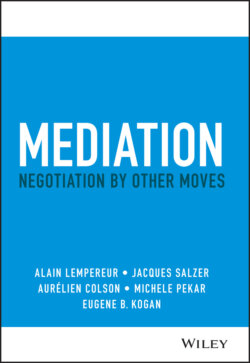Читать книгу Mediation - Alain Lempereur - Страница 20
Informal Mediators
ОглавлениеThese mediators may not call themselves mediators, but do engage in mediation or an activity very close to it. They could be anyone who, in everyday life, helps parties to listen and understand each other and co‐create a solution to which everyone agrees. Here is a glimpse of the variety of these informal mediators:
A student: Between classmates.
A teacher: Between students, colleagues, parents and teachers, teachers and students.
An office colleague, boss, union official, or staff representative: Between people at work, with customers or suppliers.
An agent, broker, or representative: Stepping in at a given moment as an objective facilitator, and not as a defender of a particular cause.
A solicitor: Between the parties in conflict.
A local elected representative: Between their constituents, between the latter and economic actors or the government.
A governor: Between local and federal public authorities, or between two local authorities, or in their relations with economic actors.
A policeman or policewoman: Between two conflicting spouses, between squatters and owners of the premises, between protesters from opposite sides (Cooper 2003).
A member of the military during a peacekeeping mission, or a humanitarian in crisis: Between belligerents, between the latter and the civilian population.
This list highlights numerous roles, functions, and professions that involve informal moments of mediation. According to a strict definition of mediation, only people outside and independent of the parties are considered as mediators. But in reality, mediation is employed by a range of people (as above) and occupies a much larger role as a method to pacify relationships or solve a particular problem. Rather than being in a position of authority or adviser or negotiator in their own name with their own motivations, informal mediators do not intervene for their own interests or to favor one side over the other. However, there is always a slight risk of sliding into other forms of intervention, such as arbitration. This is why mediation, as elaborated in this book, calls for professionalism, principles, ethics – methods, even though it is sometimes legitimate and useful that everyone can, on occasion and without formality, serve as a mediator.
The concerned parties need to accept the mediator as such, as well as the mediator's approach to mediation. In informal mediation, most often, the mediator intervenes without formal acceptance for their role: mediation remains implicit, taking place even without the parties being aware of it. In cases where the process is more explicit, if an informal mediator presents themselves with a sincere desire to settle a problem which is not theirs and which has weighed on the parties for some time, and if the parties trust the mediator to understand both sides, the mediator will be welcomed and appreciated. Thus, if informal mediators have acquired the know‐how, they can sincerely and efficiently leverage the potential of mediation. But it is not enough for mediators to show their good will: the parties need to also accept them, at least implicitly, in this role. Sometimes the parties may prefer to receive advice or obtain a decision ruled by an authority, or may not want anyone to interfere in a conflict that they prefer to settle themselves.
Let us now explore two major models of “formal” mediators, which are designated and considered as such by the parties involved.
